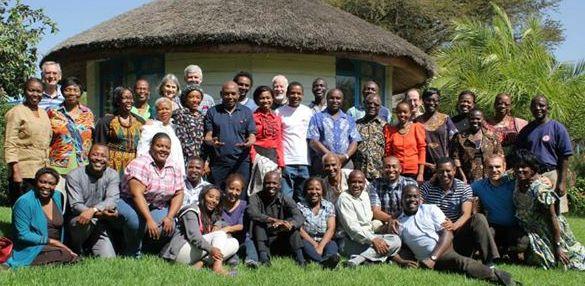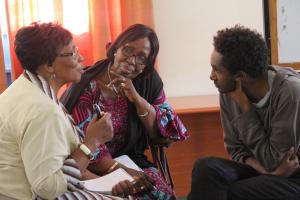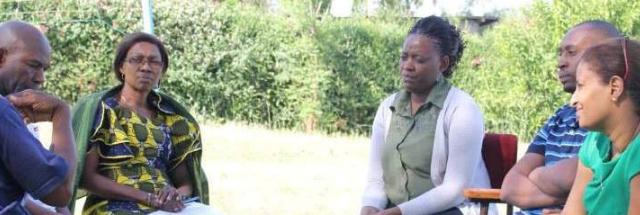 Background
Background
The African Coordination Group [ACG] called for a continent-wide consultation which was held in the town of Debre Zeit near Addis Ababa in Ethiopia. Present were 42 participants at the heart of IofC in Africa. Delegates came from Burundi, Democratic Republic of Congo, Cameroon, Kenya, Sudan, Uganda, Rwanda, Ethiopia, South Africa, Zimbabwe, Nigeria and South Sudan.
 The consultation was to strengthen network ties among the IofC bodies across the African continent, elect the new ACG members, deliberate on the next steps with Workshop for Africa and discern what God is calling us in Africa to do, as individuals, countries and the continent. The days were filled with discussions (and emotions) to get clarity on the way forward. We were grateful for the presence and input on different levels by Edward Peters, Vice President of IofC International, and his wife, Elisabeth, (UK and Sweden), as well as Rev John Burrell (UK).
The consultation was to strengthen network ties among the IofC bodies across the African continent, elect the new ACG members, deliberate on the next steps with Workshop for Africa and discern what God is calling us in Africa to do, as individuals, countries and the continent. The days were filled with discussions (and emotions) to get clarity on the way forward. We were grateful for the presence and input on different levels by Edward Peters, Vice President of IofC International, and his wife, Elisabeth, (UK and Sweden), as well as Rev John Burrell (UK).
Outcomes of the Consultation
At the end of this short and essential time, the following outcomes were established and agreed upon:
A new Strategic Framework for Africa
Vision
Ethical leadership and good governance as the benchmark for all the institutions of Africa.
Mission
Developing the teams that will help build the culture of ethical leadership and good governance in the civic, political and business institutions of Africa.
Strategic Direction 1: Starting with Ourselves
GOAL: To live out IofC’s approach in our personal lives and organizational activities as we learn from and seek to heal our past, put the care for others first and embrace the challenges of living simply.
PRIORITIES
- To embed the essence of IofC in the life of our teams and boards
- To apply IofC’s core values to how we function, namely searching for God's guidance in quiet and living by absolute moral standards of honesty, purity, unselfishness and love.
- To implement inclusive & effective communications
- To develop new ideas and models for financial sustainability
EXPECTED OUTCOMES
- The IofC approach exemplified in everything we do
- Good governance practices active in our boards and teams
- Improved relationships and teamwork
- Local and national teams strengthened and connected
Strategic Direction 2: Empowering Changemakers
GOAL: To empower change-makers by developing opportunities for them to grow in their understanding and use of IofC methodology, practice and programmes, and to equip them with practical skills.
PRIORITIES
- To train people in the core ideas and approach of IofC
- To expand the pool of trainers
- To build the capacity and practical skills, including fund raising, by IofC teams
- To accelerate the presence of youth into positions of responsibility and decision making
EXPECTED OUTCOMES
- Well-developed training courses
- A network of highly-trained curriculum developers and course facilitators
- Clear steps for personal engagement in IofC and mentoring support
Strategic Direction 3: Responding to critical situations in our focus areas
GOAL: To unite our network’s efforts and resources across local and regional boundaries to build partnerships and achieve greater impact at a continent level.
PRIORITIES
- To address the challenge of good governance, ethical leadership and equality before the law
- To continue trust-building initiatives across the continent
- To continue the focus on food security through the Farmers Dialogue
EXPECTED OUTCOMES
- A task force available to respond to good governance challenges in different countries
- Tailored initiatives responding to the emerging need in South Sudan, Great Lakes region and elsewhere
- Expanded Creators of Peace programme in several countries
- Increased exchanges between farmers’ networks.
2. Working proposals
- Translation of Strategic Framework
The Framework is to be translated into French.
- Feedback to teams
The representatives from different countries were asked to discuss these outcomes with their home teams – specifically the Vision, Mission and Strategic Directions and the other Working Proposals - and to give comment and feedback to the ACG by end of April 2014.
- Fund-raising
African teams are to consider how to develop structures for financing and managing initiatives in Africa.
- Workshop for Africa
It was agreed to expand the original WfA Working group - Pieter Horn, Nombulelo Khanyile, Anthony Duigan, Amina Dikedi-Ajakaiye, Paul Craig and Stephen Kimaru - and to add Mediatrix Masava, John Njoroge, Joseph Karanja, Bedan Mbugua (Kenya); Khamis Kenedy (South Sudan); Mathilde Kayitesi (Rwanda); Mary Goretti (Uganda); Eldoma Hassan (Sudan); Portia Mosia (South Africa); Daphrose Ntaratase (Burundi).
- Training
It was agreed that ways needed to be found to train a corps of trainers who could train young people (in English-speaking and Francophone countries) in both ethical leadership and in the essentials of IofC.
3. Election of new African Coordination Group
The six elected and re-elected African Coordination Group members are:
Amina Dikedi-Ajakaiye [Nigeria – Convenor], Stephen Kimaru [Kenya – Treasurer], Adalbert Otou Nguini [Cameroon], Roy Ncube [Zimbabwe], Joanne Lubega [Uganda] and Abiodun Owoseni [Nigeria].
They will each serve a three year term. Roy Ncube, Amina Dikedi-Ajakaiye and Stephen Kimaru are eligible for re-election to serve a further three-year term.


